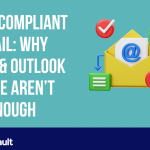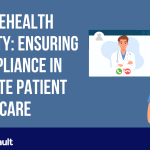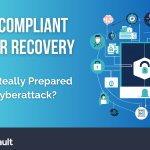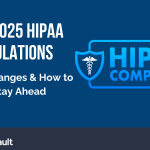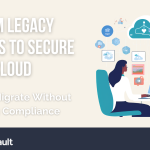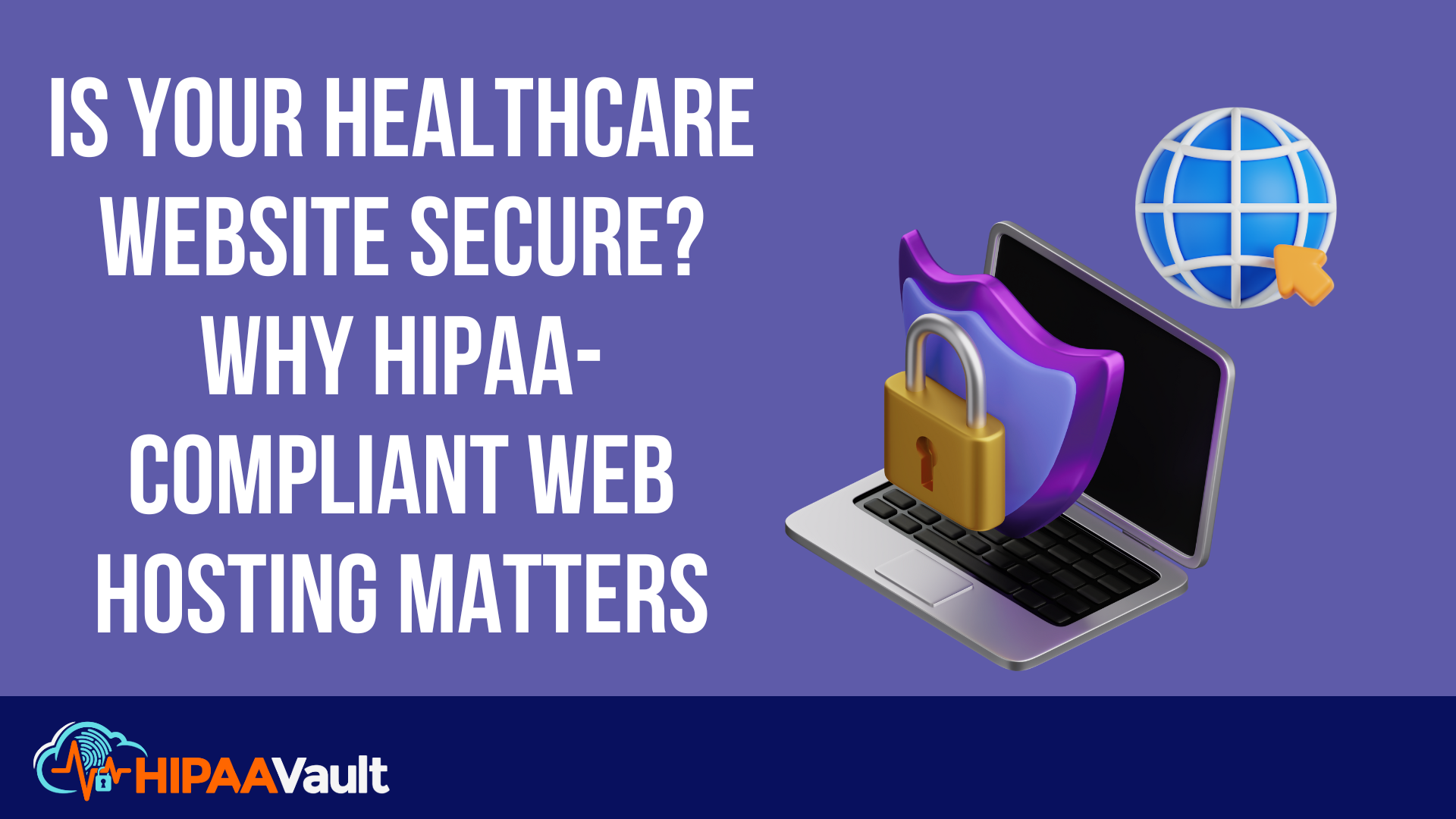
Introduction: The Role of Web Security in Protecting Patient Data
The healthcare industry is a prime target for cyberattacks, with data breaches costing an average of $10 million per incident. Ensuring your healthcare website is secure isn’t just about protecting patient data—it’s a legal and ethical obligation. The Health Insurance Portability and Accountability Act (HIPAA) enforces strict requirements to protect patient health information (PHI), and non-compliance can lead to hefty fines, reputational damage, and loss of patient trust.
A HIPAA-compliant web hosting provider like HIPAA Vault can help safeguard PHI while ensuring regulatory compliance. This guide explores common vulnerabilities in healthcare websites, essential security measures, and why HIPAA-compliant hosting is crucial for maintaining data integrity and patient confidentiality.
1. Common Vulnerabilities in Healthcare Websites
SQL Injection & Malware Attacks
Many healthcare websites rely on dynamic databases, making them particularly vulnerable to SQL injection attacks. Hackers exploit weak points in website code to gain unauthorized access, allowing them to manipulate databases, extract sensitive information, and compromise PHI. These breaches can have devastating consequences, leading to identity theft, financial fraud, and legal repercussions for healthcare providers.
Unsecured APIs & Third-Party Plugins
APIs and plugins are essential tools for integrating various healthcare applications, but if not properly secured, they can become gateways for cybercriminals. Attackers can exploit API vulnerabilities to intercept sensitive data during transmission, injecting malicious code that compromises system integrity.
Lack of Encryption
Unencrypted data transmission significantly increases the risk of data interception. Cybercriminals can easily eavesdrop on unprotected communications, capturing PHI and other confidential details. This makes encryption a non-negotiable requirement for healthcare organizations.
Solution: Regular security audits, vulnerability scanning, and penetration testing—services provided by HIPAA Vault—help mitigate these threats by proactively identifying and addressing security gaps before they can be exploited.
2. Importance of SSL/TLS Encryption
SSL/TLS encryption is a fundamental component of secure healthcare websites, ensuring that all data transmitted between users and servers remains confidential and tamper-proof.
How SSL/TLS Protects PHI
- Data Confidentiality: Encryption prevents unauthorized parties from accessing sensitive information during transmission.
- Data Integrity: Ensures that transmitted data remains unaltered and authentic.
- Authentication: Confirms that the communication is occurring between legitimate parties, reducing the risk of phishing and man-in-the-middle attacks.
Action Step: Ensure your web hosting provider includes an SSL/TLS certificate as part of their service. HIPAA Vault’s hosting solutions provide pre-configured encryption to keep your website secure, eliminating the need for manual implementation.
3. Secure Login & Authentication Measures
Multi-Factor Authentication (MFA)
MFA adds an extra layer of security by requiring users to verify their identity using multiple credentials, such as a password and a one-time verification code. This significantly reduces the risk of unauthorized access, even if login credentials are compromised.
Single Sign-On (SSO)
SSO simplifies authentication by allowing authorized users to access multiple applications with a single login while maintaining security. This improves user convenience without sacrificing data protection.
Role-Based Access Control (RBAC)
RBAC ensures that users only have access to the information and functionalities necessary for their roles, minimizing the risk of data exposure due to internal threats or accidental leaks.
HIPAA Vault’s hosting services include:
- Secure authentication mechanisms to prevent unauthorized access.
- Continuous monitoring to detect suspicious activity in real-time.
- Customizable role-based access controls for optimal security.
4. Automated Backups & Disaster Recovery
A secure healthcare website isn’t just about preventing attacks—it’s also about ensuring operational continuity in the event of an incident.
Why Automated Backups Matter
- Prevents Data Loss: Ensures critical patient data is not permanently lost due to cyber incidents or system failures.
- Ensures Data Availability: Meets HIPAA’s data retention requirements while allowing seamless recovery.
- Reduces Downtime: Allows healthcare providers to resume operations quickly after an attack or technical failure.
Disaster Recovery Solutions
HIPAA Vault offers fully managed Disaster Recovery as a Service (DRaaS), ensuring that your data is securely backed up and recoverable in case of breaches, natural disasters, or system failures. This proactive approach minimizes disruption, keeping patient services running smoothly.
5. HIPAA Vault’s Secure WordPress & WooCommerce Hosting
Many healthcare organizations use WordPress or WooCommerce to manage their websites and online patient portals. However, without proper security measures, these platforms can be vulnerable to cyberattacks.
Why Choose HIPAA Vault’s Secure Hosting?
- HIPAA-Compliant Infrastructure: Built on Google Cloud with multiple layers of security.
- Real-Time Threat Detection: 24/7 monitoring and automated security patches prevent attacks before they happen.
- End-to-End Encryption: Full encryption of stored and transmitted data ensures compliance.
- Managed WordPress Security: Includes secure plugins, automated updates, and advanced firewall protection to block malicious activity.
HIPAA Vault’s secure WordPress hosting ensures that your healthcare website remains compliant, fast, and resilient against threats, giving you peace of mind that patient data is always protected.
Conclusion: Steps to Ensure a Secure Healthcare Website
To keep your healthcare website secure and HIPAA-compliant, follow these critical steps:
- Conduct Regular Security Audits – Identify and fix vulnerabilities before they become threats.
- Use SSL/TLS Encryption – Encrypt all transmitted patient data to prevent interception.
- Implement Strong Authentication – Enforce MFA, SSO, and RBAC for access control.
- Ensure Automated Backups & DR Solutions – Prevent data loss with disaster recovery planning.
- Partner with a HIPAA-Compliant Hosting Provider – Secure your infrastructure with a trusted provider like HIPAA Vault.
Investing in HIPAA-compliant web hosting isn’t just about meeting regulations—it’s about safeguarding patient trust, ensuring business continuity, and protecting against the ever-growing threat of cyberattacks. Contact HIPAA Vault today to learn how our managed security services can protect your healthcare website and keep your patient data safe.

